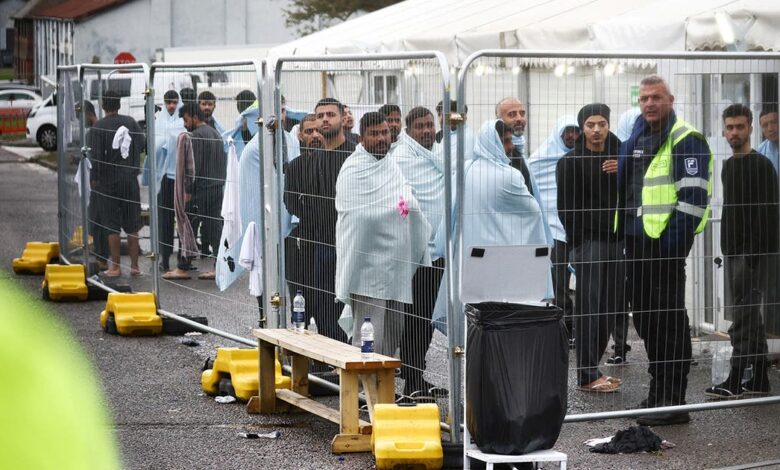Home Office ignored warnings on diphtheria weeks before Manston outbreak

The government was warned that asylum seekers in reception centres should be vaccinated against diphtheria – but failed to act – weeks before a man held at the overrun Manston site died, The Independent can reveal.
A risk assessment issued by the European Centre for Disease Prevention and Control (ECDC) on 6 October said the illness was spreading among migrants and a “severe outcome” was possible for those living in crowded facilities.
The Independent understands that the UK Health Security Agency (UKHSA) issued a briefing note in September warning of an increase in diphtheria cases in Britain and Europe and reminding authorities working with migrants to ensure they were vaccinated.
But the mass use of antibiotics and vaccinations at Manston did not start until earlier this month. Previously, migrants were not having their diphtheria immunisation status checked until they were seen by a GP after being moved to hotels.
By that point, many had been detained in crowded tents at the former military base for weeks because of a shortage of Home Office accommodation.
The ECDC bulletin on 6 October said a migrant had already died of diphtheria in Europe and added: “Most of the current cases are being reported among migrants residing in potentially crowded settings and where some individuals may be unimmunised or under-immunised … in these settings, a severe outcome following a diphtheria infection is possible.”
The ECDC warned that the impact of an outbreak in migrant reception centres would be worse than in the broader population, and “heightened in instances where response measures are delayed”.
It recommended measures including the “identification and vaccination of individuals residing in migrant centres who have incomplete vaccination status”, isolation of possible cases, contact tracing and “limiting situations of overcrowding in migrant centres”.
The bulletin was issued as the population of Manston, a former military base meant to hold a maximum of 1,600 migrants for 24 hours at a time, soared towards a peak of 4,000 by the end of October.
A report arising from a visit by the prisons watchdog in July raised concerns about the “poor management” of asylum seekers with infectious diseases at Manston, saying: “Detainees were placed in a claustrophobic portacabin with no clear responsibility assigned for managing their care. Paramedic staff were unsure of any guidance, policy or procedure for the management of infectious diseases.”
But Home Office ministers and officials downplayed concerns about diphtheria until Monday, when the UKHSA said there had been 50 confirmed cases among asylum seekers so far this year, with two severe cases requiring hospitalisation and one death.
“In initial reception centres where there are challenges to individual case management and contact tracing, mass antibiotic [dosing] and vaccination of residents have been recommended,” a report added. “The Home Office is working with the NHS and other partners to operationalise this.”
ECDC documents show that Britain was the second country in Europe to record diphtheria among migrants this year, reporting its first case in February, but Home Office ministers and officials did not make any public statements until media reports of an outbreak at Manston in late October.
Representatives responding to questions about diphtheria from parliament’s Home Affairs Committee on 26 October made no mention of vaccination or isolation.
Dan O’Mahoney, the Clandestine Channel Threat Commander, said a “very small number of cases” at Manston were being “dealt with expertly”, adding: “I would not describe it as an outbreak”.
On 31 October, Suella Braverman answered a question on diphtheria in parliament by accusing an MP who called the conditions at Manston unsafe and inhumane of using “inflammatory language” and saying they should not “create alarm unnecessarily”.
“We are aware of a very small number of cases of diphtheria reported at Manston, but it has very good medical facilities and all protocols have been followed,” Suella Braverman added.
The following day, Home Office minister Lord Murray told the House of Lords that medical facilities at the former military base were “first class”.
Addressing parliament on Monday, immigration minister Robert Jenrick denied that it had taken the death of the migrant on 19 November for the government to focus on the threat from diphtheria.





